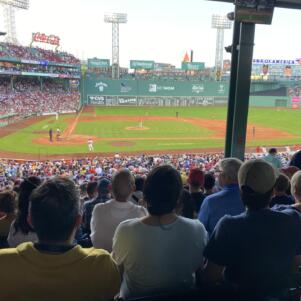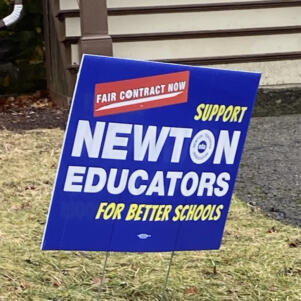The BLOG: Culture
The sound of defiance: U2 at 40
James P. Freeman | October 1, 2016
“I don’t mean to sound arrogant, but even at this stage,
I do feel that we are meant to be one of the great groups.”
— Bono, as told to Rolling Stone, 1981
No one could have imagined the significance of that first gathering, held in a kitchen, over the north side of Dublin, on a Saturday… September 25, 1976, to be precise. Equipped with makeshift instruments and make-believe invincibility — admittedly with more ambition than ability — four teenage friends, known simply as Paul, Dave, Larry and Adam, formed a collective that would eventually be called U2.
Forty years later, still friends and known universally as Bono, Edge, Larry and Adam, and still intact as a band, U2 remains rock music’s most enduring super group. As Bruce Springsteen said in March, 2005 — while recalling seeing U2 perform in the early 1980s — during his marvelously reverential Rock and Roll Hall of Fame induction speech, “I was listening to the last band of whom I would be able to name all of its members. They had an exciting show and a big, beautiful sound. They lifted the roof.”
That sound has sold 157 million records worldwide and won 22 Grammy awards in America.
Still, after all these years, there is something uniquely appealing about U2 today. Certainly, there is the romantic idealism of their music (the “plangent sensuality” of Bono’s voice and “radiant lyricism” of The Edge’s guitar) along with their quest for social justice through global activism. But that only partially explains it. Perhaps most importantly, they embrace a transcendent spirituality that is captured in all their work.
“From the start,” reasons The Rolling Stone Files, “U2’s postalienationist rock has stressed communion over segregation, compassion over blame, hope over despair.” Just this past week on the PBS program, “Charlie Rose,” Bono insisted that music is the “language of the spirit.” U2’s work is the “beautiful arc” of melodies and ideas. And in U2’s post-punk vernacular, their spirituality is “pure joy as an act of defiance.”
In many respects, U2 has been defined by defiance. They are the sound of defiance. Defying odds, critics, trends, tones, politics, celebrity and mortality.
Remarkably, Boston figured prominently in U2’s early history. What were the odds that an aspiring, but largely unknown, deejay named Carter Alan from the progressive station WBCN-FM, would stumble across two nondescript import forty-five singles on a hot August day in 1980, at Kenmore Square’s New England Music City store, by an Irish outfit named U2? The singles were “A Day Without Me” (beginning with the line “Starting a landslide in my ego”) and “11 O’Clock Tick Tock.” Soon, an import copy of their first full album, Boy, would be featured on the radio station.
In his book, the wonderfully engaging Outside Is America, U2 in the U.S., Alan quotes U2’s then-manager, Paul McGuinness, after the band’s first Boston concert in December 1980: “In fact, since you are already playing it [Boy], you can consider yourself to be the first American station to do so.” Their Boston debut — and just seventh American performance — occurred at the old Paradise Theater (now known as Paradise Rock Club) on Commonwealth Avenue, where 150 people attended to see U2 support a Detroit band known as Barooga. U2 played 10 songs total, including two encores and “11 O’Clock” was played twice.
Overall, according to U2gigs.com, a kind of Elias Book of Baseball Records for U2 geeks, U2 has played 44 concerts in Massachusetts (Boston, Worcester, Foxboro, Somerville, and Amherst) from 1980 to 2015 (their last tour). Since 2005, they have played the venue now sporting the TD Garden name 15 times. The two most-performed songs in Boston are “Pride (In the Name of Love)” and “Sunday Bloody Sunday” (tied at 32 times each). Boston-proper ranks 6th in the top 25 played cities worldwide.
And what were the odds that the lead singer of U2 would give the Class Day Address at Harvard University on June 6, 2001?
With a charming irreverence — often times silly and serious – and inspired bravado, Bono spoke of his efforts at debt cancellation for the world’s poorest countries (Jubilee 2000) and AIDS drugs for Africa and the challenges faced by popstars and politicians with a cause (a “new level of ‘unhip’ for me”). There, he asked, “Isn’t ‘Love thy neighbor’ in the global village so inconvenient?”
He also raised this idea: “Civil Rights in America and Europe are bound to human rights in the rest of the world. The right to live like a human. But these thoughts are expensive – they’re going to cost us. Are we ready to pay the price? Is America still a great idea as well as a great country?”
On Charlie Rose, Bono suggested that U2 is driven by the future. “We always think where we’re going,” he said. That is rare for any group of people in business for such a long time who might be more inclined to see where they have gone, not where they are going. Bono at times has intimated that U2 will end when they stop being relevant. So far, they have defied being irrelevant too.
What does the future hold for a band about to enter its fifth decade together?
The song “40” (named after Psalm 40, a song actually played live 400 times, surely a sign of grace over karma) contains a lyric that might lead the way.
“He set my feet upon a rock
And made my footsteps firm
Many will see
Many will see and hear
I will sing, sing a new song”
James P. Freeman is a New England-based writer and a former Cape Cod Times columnist.






